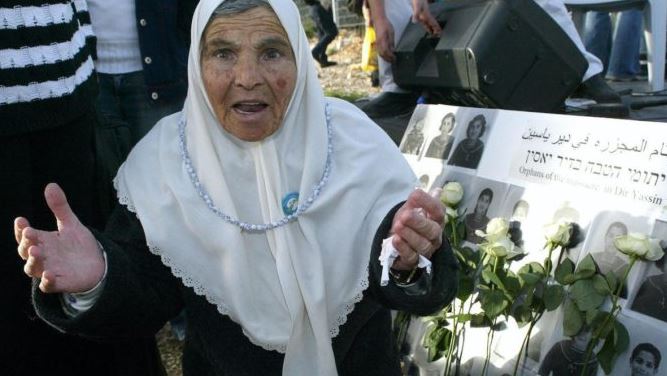In its place, in 1951, the newly-created State of Israel built a psychiatric health centre, making use of some of the village’s buildings that remained intact. But Deir Yassin is more than a village; its story encompasses the entire Palestinian tragedy.
Deir Yassin was a peaceful village whose less than 1,000 residents lived quite a relaxed life, with a degree of economic prosperity. The village was famous for its limestone cutting business. However, all that changed on 9 April, 1948, when a couple of hundred armed Zionist militias walked into the village and committed one of the earlier massacres that became standard practice for the newly-founded monster of the Middle East – Israel.
On that Friday, 73 years ago, anywhere between 100 and 250 women, children and unarmed young men were killed in a few hours, for no reason other than being Palestinian. Those who survived, fearful and terrified, left their homes and properties to seek shelter elsewhere. They became just another number in the still ongoing uprooting of Palestinians from their homes.
No one has ever been held accountable for the Deir Yassin massacre.
Menachem Begin was one of the Zionist fanatics who led an armed gang, known as Irgun, with members from another militia called Lehi, to slaughter unarmed Palestinian civilians. Both groups were just two of dozens of other Zionist armed groups operating in Mandatory Palestine. Before, during and after the Nakba, their main tasks were preparing the ground for the creation of modern-day Israel by killing and displacing as many Palestinians as possible – a scorched-earth policy that has been in practice since the early days of Israel.
Ironically enough, Begin reinvented himself, as did most earlier Israeli leaders, to become a politician and even serving as prime minister from 1977 to 1983. His career peaked in making peace with Egypt as the first Arab country to normalise ties with Israel. Born in modern-day Belarus, Begin became one of the well-known gang leaders in the British Mandate of Palestine, capable of anything as long as it was helpful to Israel.
Zionist propaganda even tried to dispute the fact that the massacre of Deir Yassin ever took place. However, that painful and shameful fact is now beyond any historical doubt, just like other infamous world massacres, such as the My Lai massacre committed by the US military in South Vietnam in 1968.
A Jewish journalist in Jerusalem, who witnessed the massacre unfolding, wrote that all reports about the massacre were “direct, fresh and convincing”. However, many extremist Zionists “still refuse to believe it.”

The Deir Yassin massacre took place on April 9, 1948, when around 120 fighters from the Zionist paramilitary groups Irgun and Lehi attacked Deir Yassin, a Palestinian Arab village of roughly 600 people near Jerusalem
Natan Friedman-Yellin, a criminal himself, found the Deir Yassin massacre to be “inhuman.” He was a joint commander of the Jewish Stern Gang in 1948, yet he could not swallow his colleagues’ actions.
A member of the UK delegation to the United Nations (UN), in a letter dated 20 April, 1948, confirmed the attack on Deir Yassin in which “250 Arab men, women and children” were killed in “circumstances of great savagery”. Palestine, at the time, was a UK Mandate territory pending final status determination by the UN.
Killing civilians and destroying entire villages and towns became embedded in the Israeli military code of conduct and is still widely practiced today, but with more lethal power. As a result, we have seen dozens of massacres committed by the Israeli army in broad daylight and broadcasted live on world television. Not a single Israeli military officer has ever been held accountable so far.
The Israeli army made a name for itself by blatantly killing civilians and ignoring all international laws that regulate wars and conflict. For example, in 2009, it bombed a UN school in Gaza, killing at least 40 civilians who were sheltering in the building. On 18 April, 1996, the Israeli army fired motor shells on a UN compound near the small Lebanese village of Qana. Over 100 civilians who sought protection in the area were killed in minutes. Both the school in Gaza and the compound in Qana were clearly marked as UN properties. Like Deir Yassin, no one was held accountable. Both the Qana massacre and the Gaza school atrocity have passed without thorough investigation and proper accountability.
Recent developments, however, do offer a glimpse of hope. The International Criminal Court (ICC) in The Hague has opened its first investigation into Israel’s crimes in the West Bank and Gaza. On 3 March, ICC Prosecutor Fatou Bensouda announced that her office would launch the investigation to cover all suspected crimes since 2014.
Israel rejects any investigation into its war crimes in Palestine, and Benjamin Netanyahu has repeatedly rejected the ICC probe. As usual, Israel has the US’ full backing in rejecting any ICC investigation, despite the mounting evidence that the Israeli army did commit crimes against humanity and war crimes in its repeated operations in Gaza and the West Bank. Both Israel and the US are not members of the ICC and do not recognise its jurisdiction.
Not much is expected from the ICC’s probe, but still, it has a kind of deterring effect for the future. By launching its investigation, the ICC sends a clear message to individual Israeli politicians and army officers that they are being closely watched. It also says that Israel might have the potential for another Deir Yassin and even worse massacres, but it is not as immune as it once was decades ago.
Source: Palestine Responds


WRITE YOUR COMMENT